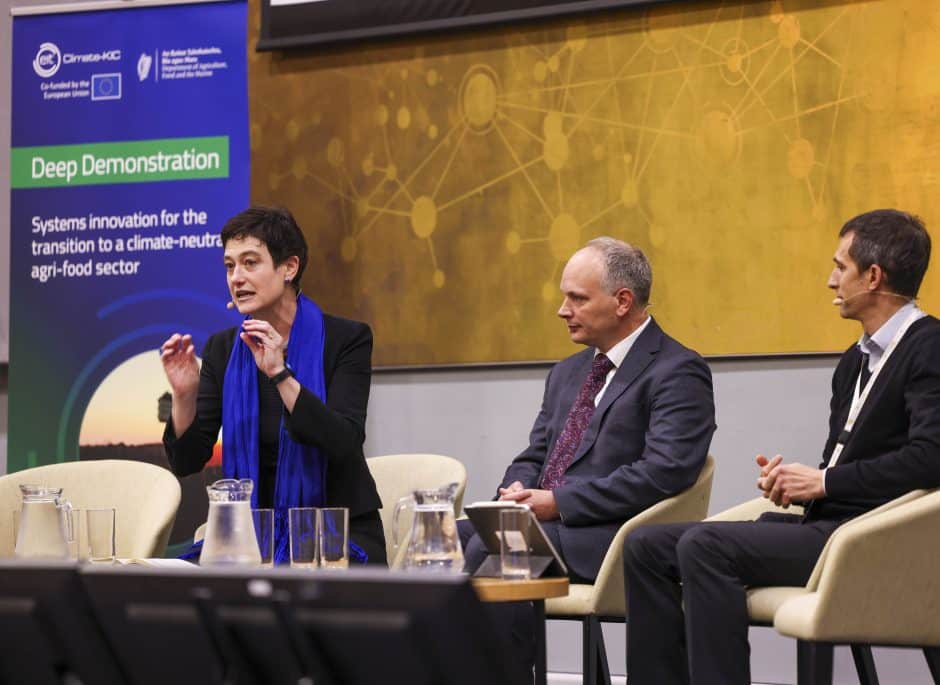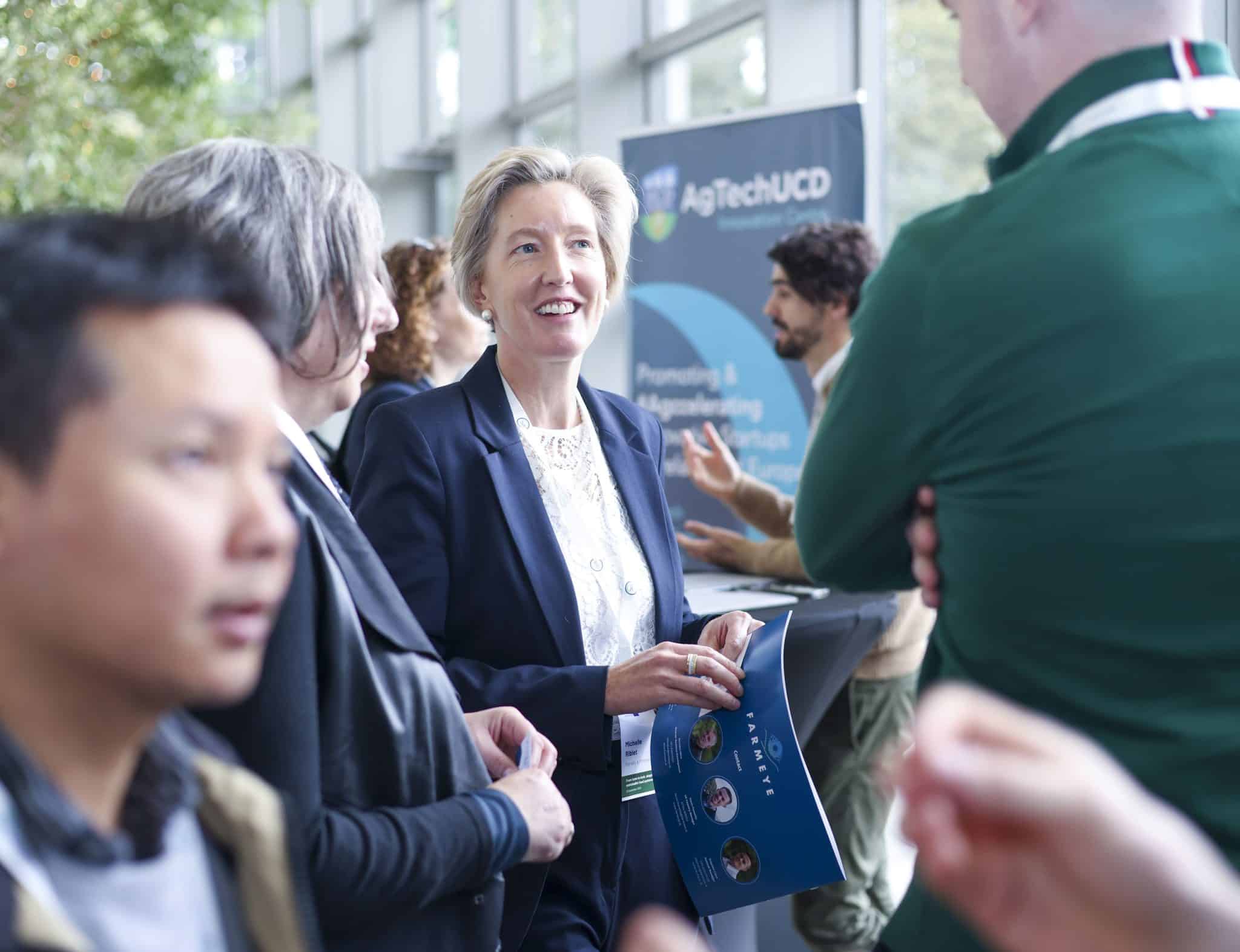How radical collaboration is transforming food systems in Ireland

Earlier this year, the Irish government set out ambitious plans for its land and agri-food system, with a commitment to reduce emissions from agriculture by 25 per cent by 2030. The Deep Demonstration partnership between the Department of Agriculture, Food, and the Marine and Climate KIC, Europe’s largest climate innovation initiative, is helping the country meet its goal by fostering a deep-rooted collaborative approach among key actors in the agri-food value chain.
We’ve seen in a previous article how Ireland is addressing the heavy carbon footprint caused by its agri-food sector to embed climate-smart agriculture and food systems innovation. One and a half years after the Deep Demonstration partnership kicked off, the country is now ready to harness the power of radical collaboration to develop and deploy coordinated innovation actions at scale.
In our recent conference held in Dublin, key figures from government, academia, and the private sector gathered to discuss the imperative of working collectively towards sustainable food systems. “Our journey towards sustainable agriculture requires a collective effort” stressed Minister of State Martin Heydon, who opened the event with a keynote address. “Our Food Vision 2030 strategy calls out the need for new, innovative approaches involving non-traditional partners for advancing climate action, and led to the collaboration with Climate KIC.”
Connecting the dots on the ground
During the past year, Climate KIC has conducted a comprehensive mapping of the Irish agri-food system, and engaged with dozens of farming and agribusiness practitioners to better understand what key levers of change can be effectively pulled to accelerate this transition. One key need emerging is finding common ground across (often contrasting) disciplines, sectors and perspectives.
“Climate KIC serves as a connector, bringing decision-makers, investors, and innovators together to drive systemic change,” explained CEO Kirsten Dunlop. “Breaking down silos and enabling collaborative efforts that span industries and regions are integral to what we do.”
This doesn’t mean reinventing the wheel, but often connecting the dots and give a meaningful direction to similar initiatives and projects flourishing on the ground, such as the Bioregional Weaving Lab in Waterford.
Addressing national, European, and global commitments
This collaborative approach echoes recent efforts from the European Union to set up Regional Innovation Valleys for Bioeconomy and Food Systems. John Bell, Director for Healthy Planet at the European Commission’s Directorate-General for Research and Innovation, recognised the need to step outside our comfort zones and engage in dialogue that transcends traditional boundaries: “You don’t change things without taking risks. Institutions like the European Commission or the Department of Agriculture in Ireland or even universities – we’re in a risk-averse culture. But if we’re going to get to where we need, we need to try and fail, we need to listen and learn… and we need to move things forward.”
In his intervention, Bell also commended Ireland’s commitment to becoming the “green heart of the Green Deal” and the need for more “Deep Demonstrations” to build trust, noting that “there’s a lack of trust in the system almost everywhere”. He added that the Deep Demonstration partnership in Ireland is an opportunity to test and demonstrate how to scale up innovation from the community level up, and that it will be interesting to see where this leads, when the Irish take on the EU Presidency in 2026 – a key moment to shape what the Union will look like in 2030.
Irish farmers are ready to embrace disruptive change
How does this translate to more sustainable practices for those on the ground? Thomas Drumm, a veteran farmer of over 50 years and co-founder of Freshgraze, emphasised the imperative for disruptive thinking in the farming community. Drumm underscored the shift from conventional approaches that sought to dominate nature through mechanical and chemical means to a more sustainable philosophy. His startup takes centre stage in this shift, introducing an automated moving fence that redefines pasture management and provides a sustainable solution for farmers.
Drumm articulated many farmers’ willingness to recognise the problems inherent in the current system, impacting both pollution and the health of their animals. “There is another way to approach this” he said, “and it is agroecology, regenerative agriculture, involving a change of thinking”.
Freshgraze seeks to put this into practice by consistently allocating precise portions of fresh pasture to cows, fostering efficient grazing of biodiverse swards. The system empowers farmers to navigate the intricate interactions between animals, plants, and soil from a mobile app.
Beyond optimising the needs of animals, plants, and soil, this innovation also streamlines operations by eliminating the need for temporary fences. This allows efficient resource use, increasing profits while producing food in a more sustainable manner. Drumm and his sons have developed and successfully tested a few prototypes, and hope now to secure additional funding to take their startup to the next level.
Financing the transition
Climate KIC’s Deep Demonstration in Ireland is now moving to its next phase, and it’s looking for funders (both public and private) as well as implementing partners to kickstart a portfolio of over 200 projects under seven flagship areas of innovation. These encompass a range of issues, from envisioning a sustainable agriculture future by 2050 to exploring new industries and value chains.
Bill Callanan, Chief Inspector at DAFM, emphasised the Deep Demonstration’s role in creating a supportive framework for private investment, ensuring a sustainable and long-term impact: “This isn’t just about providing funding. It’s about creating the right ecosystem for these innovations to thrive”.
The challenge now is supporting farming communities to embed these innovations in traditional practices that date back to decades. “Farmers listen to other farmers” concluded Callanan. “You have to just have examples that they can see, and visualise, and understand well, and that make sense. That’s where Climate KIC comes in.”
Climate KIC will be at COP28 in Dubai, UAE, from November 30th to December 6th, to talk about how we support city, regional and national leaders to bridge the gap between climate goals commitments and current reality. Join our COP28 side events (online and on-site) and learn more about our COP28 ambitions. Subscribe to our mailing list if you’d like to receive more information about our activities at COP28.


